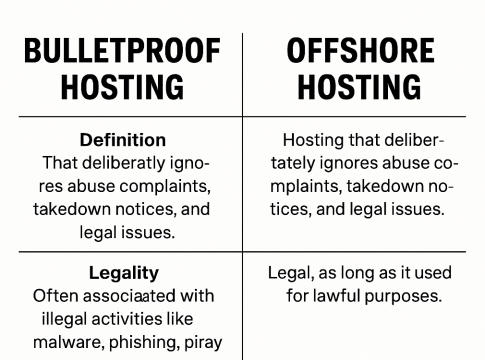In today’s digital-first world, web hosting is the backbone of any online business or platform. But not all hosting services are created equal. While most people are familiar with shared hosting, VPS, or cloud hosting, fewer understand the terms offshore hosting and bulletproof hosting.
These two concepts are often confused, yet they differ significantly in purpose, legality, and reputation. In this article, we’ll break down what offshore hosting and bulletproof hosting mean, their advantages, disadvantages, and how they compare.
What is Offshore Hosting?
Offshore hosting simply means hosting your website or online platform on servers located outside your home country. Businesses or individuals choose offshore hosting for a variety of reasons — from privacy protection to content freedom.
For example, a company in the US may choose to host in Switzerland or Iceland to avoid strict DMCA (Digital Millennium Copyright Act) takedown rules.
Benefits of Offshore Hosting
-
Freedom of Speech and Censorship Resistance: Journalists, bloggers, and activists often host offshore to escape censorship in their home country.
-
Privacy Protection: Offshore hosts usually offer strong privacy policies and may accept cryptocurrency payments for anonymity.
-
Stronger Data Laws: Countries like Iceland, Netherlands, and Switzerland have strict data protection regulations.
-
Legal Flexibility: Industries such as gambling, forex trading, and adult content may choose offshore hosting because such businesses are restricted in their own countries.
Risks of Offshore Hosting
-
Jurisdiction Conflicts: If you face a dispute, it may be difficult to resolve it across international legal systems.
-
Costs: Offshore hosting often comes at a higher price due to specialized infrastructure.
-
Trust Factor: Not all offshore providers are reliable — some may oversell privacy claims.
What is Bulletproof Hosting?
Bulletproof hosting takes the idea of offshore hosting a step further. It refers to hosting services that ignore abuse complaints, government takedown notices, or copyright claims.
These providers often operate in jurisdictions with weak cybercrime enforcement or deliberately choose to look the other way.
Bulletproof hosting has a notorious reputation because it is frequently associated with illegal or malicious activities such as:
-
Phishing websites
-
Malware distribution (C2 servers, botnets)
-
Spam campaigns
-
Fake online stores or scams
-
Piracy and warez sites
Why Some People Choose Bulletproof Hosting
-
Abuse Complaint Immunity: Unlike regular hosts, bulletproof providers do not suspend services for DMCA or copyright violations.
-
Anonymous Setup: Many allow registrations with fake details and payments via cryptocurrency.
-
DDoS Resistance: Some bulletproof hosts offer strong DDoS protection to keep sites online despite attacks or takedown attempts.
Risks of Bulletproof Hosting
-
High Risk of Seizure: Authorities may eventually track and shut down these servers.
-
Legal Trouble: Using bulletproof hosting for illegal activities exposes users to lawsuits, fines, or even criminal charges.
-
Reputation Damage: Any business using bulletproof hosting risks losing trust with partners and customers.
Offshore Hosting vs Bulletproof Hosting – Key Differences
| Feature | Offshore Hosting | Bulletproof Hosting |
|---|---|---|
| Definition | Hosting servers in another country to take advantage of privacy laws, data protection, or content freedom. | Hosting that deliberately ignores abuse complaints, takedown notices, and legal issues. |
| Legality | Legal, as long as you use it for lawful purposes. | Often associated with illegal activities like malware, phishing, piracy. |
| Use Cases | Privacy protection, bypassing censorship, legal industries restricted in some countries (e.g., gambling, adult content). | Hosting phishing kits, botnets, spam services, or pirated content. |
| Reputation | Can be legitimate (many businesses use offshore hosting legally). | Seen as shady, often targeted by law enforcement. |
| Client Base | Journalists, businesses, activists, privacy-conscious individuals. | Cybercriminals, fraudsters, spam operators. |
| Examples of Hosting Locations | Switzerland, Iceland, Netherlands, Singapore, Panama. | Russia, Ukraine, Moldova, Seychelles, parts of SE Asia. |
When to Choose Offshore Hosting
You might consider offshore hosting if:
-
You are an activist, journalist, or blogger needing protection from political censorship.
-
You run a legal but high-risk industry (like online casinos or adult platforms).
-
You want stronger data protection laws than your home country provides.
-
You require anonymity in payments (crypto, prepaid cards, etc.).
Why You Should Avoid Bulletproof Hosting
While bulletproof hosting might sound attractive for its “no questions asked” policy, it comes with huge risks:
-
High legal consequences if used for illegal content.
-
Frequent blacklisting of IPs (hurts SEO, email deliverability, etc.).
-
Often targeted by international task forces like Europol, Interpol, and national cybercrime agencies.
Unless you are knowingly engaging in illegal activity (which has serious consequences), there is no legitimate reason for a business to choose bulletproof hosting.
The Middle Ground – Semi-Bulletproof or “Abuse-Resistant” Hosting
Some providers market themselves as “semi-bulletproof”:
-
They host offshore.
-
They allow some gray-area content (gambling, adult, torrents).
-
But they will act on serious abuse complaints (like phishing or malware).
This middle ground appeals to businesses that need leniency on content laws without crossing into fully illegal activities.
Final Words
To sum up:
-
Offshore hosting = A legal, legitimate way to host websites in another country for privacy, free speech, or jurisdictional benefits.
-
Bulletproof hosting = A high-risk option that ignores abuse complaints and is often linked to illegal activity.
If your goal is privacy, censorship resistance, or data protection, offshore hosting in countries like Iceland, Switzerland, or the Netherlands is a smart choice.


